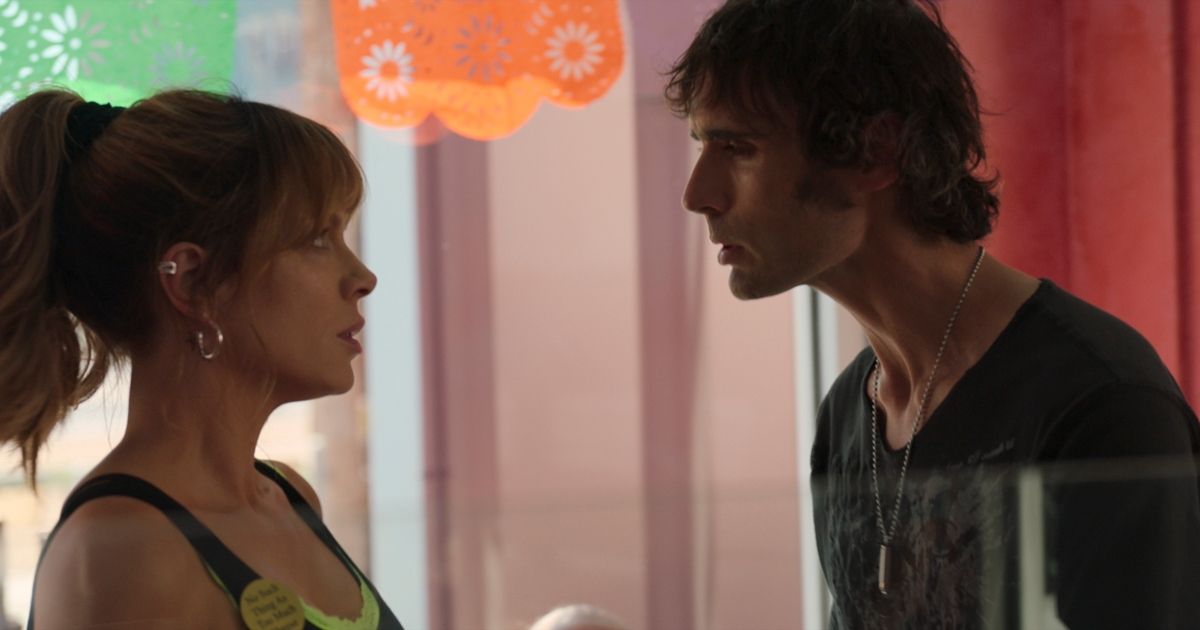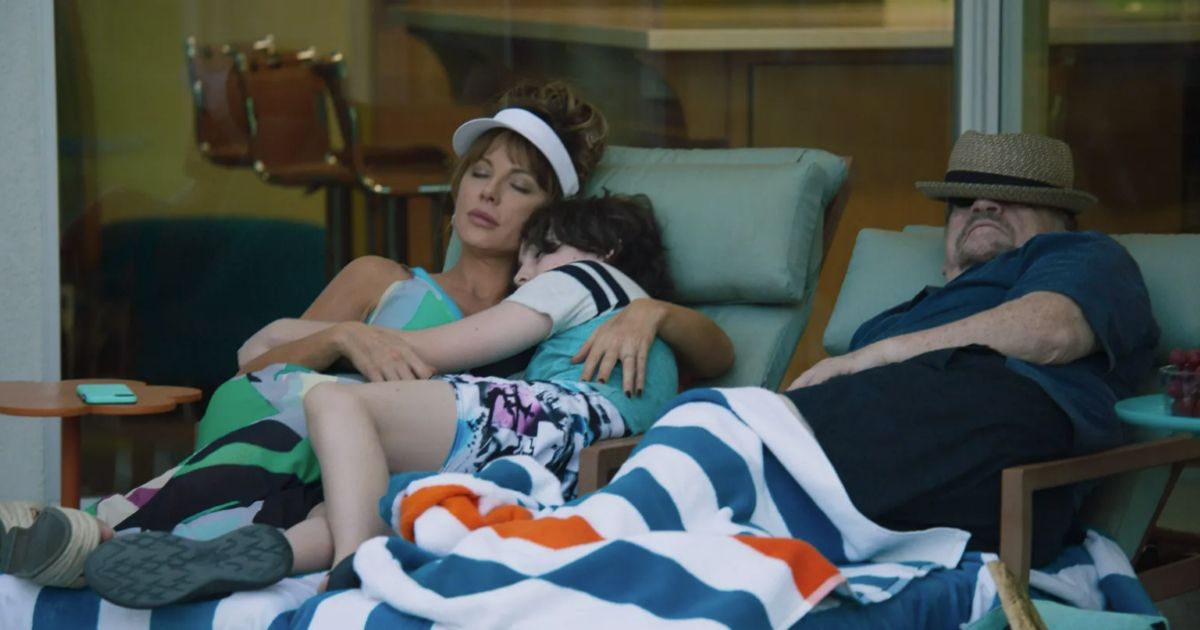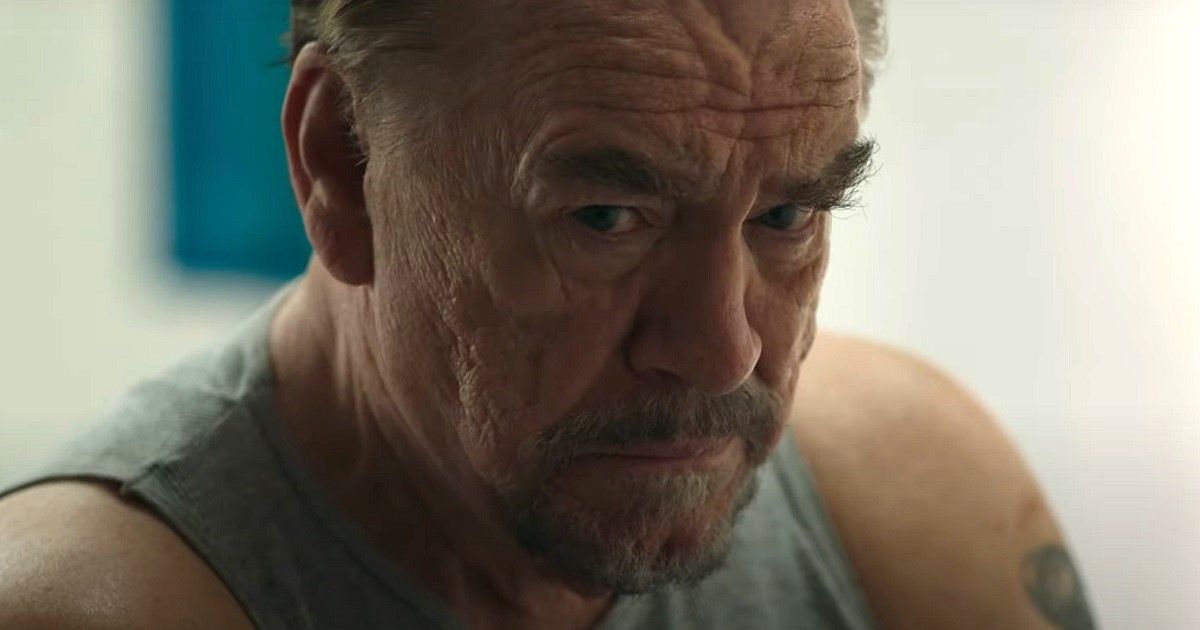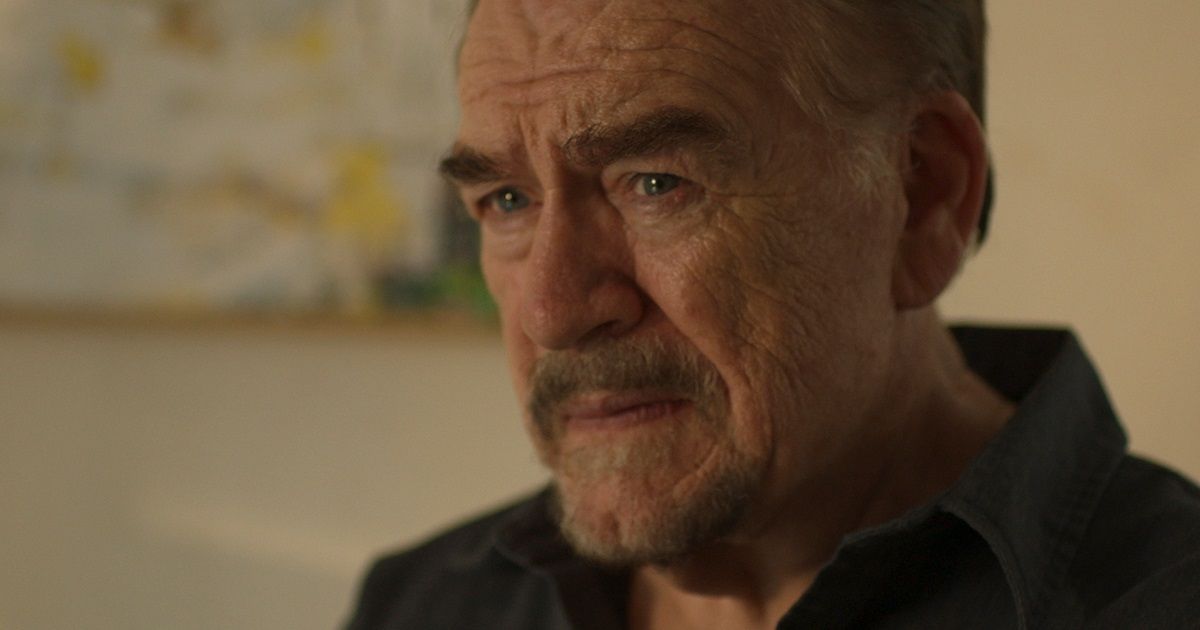Prisoner’s Daughter is an emotional character study and family drama that follows a prisoner on compassionate release as he struggles to reunite with his estranged daughter and grandson despite his illness. It’s a quietly contemplative study of violence with a star-studded team — Brian Cox plays Max, the formerly violent muscle for the mob, and Kate Beckinsale plays his daughter Maxine, a working-class woman struggling to care for her son, Ezra (Christopher Convery).
Joining Cox and Beckinsale is Tyson Ritter (singer of the band All-American Rejects) as Maxine’s ex-husband and Ezra’s father, Tyler. He’s a man who is probably (and tragically) similar to her father when he was younger — selfish, violent, and not a great father. Meanwhile, Ezra is being violently bullied and has to decide if he should be violent in return, and Max has to decide if he should return to violence in order to stop Tyler from wreaking havoc on Maxine’s life.
Behind the camera is Catherine Hardwicke, the great director behind Twilight, Thirteen, and Lords of Dogtown. She tenderly directs Mark Bacci’s script with sensitivity, empathy, and grace. The result is a subtly heart-wrenching meditation on violence, family, and redemption with wonderful performances. Ritter and Hardwicke joined us to discuss the film.
He’s Not the Bad Guy
Tyson Ritter is the lead singer and bassist of the successful American band All-American Rejects; in Prisoner’s Daughter, he plays Tyler, the musician ex of Kate Beckinsale’s Maxine, and nails the hedonistic disposition of an artist in the throes of addiction. “I definitely drew from interactions I’ve had along the way in this journey. You know, the music world is filled with very, very big egos and very toxic people, just like any performative business, just like the entertainment business in general. So yeah, there was a lot of low-hanging fruit there for me to gather from,” said Ritter.
“The heart that Tyler has for his son, and even the light that he keeps on in his heart for Maxine, Kate’s character, I think that was something that was really important to me, and speaking with Mark Bacci, the writer. It wasn’t necessarily on the page, when I did the audition.” He explained:
The room was kind of still after I finished, and they were like, ‘Hey, wow, what’s your take?’ And I was like, I think he’s the hero of the movie. I think the sad thing is, Tyler is quiet, like a lot of people in broken homes of addiction and violence […] I really wanted to make sure that that Tyler was a real human, not just some bully, not just someone who was like, ‘Oh, I’m an angry husband that’s going to hit his wife.’ I think that would be so one-sided. So I really protected my character.
Tyson Ritter Is a Father
Ritter found another entry into (and coincidental similarity with) his character — he had just had a son. Playing the father, with as much compassion as possible, was an emotional and vulnerable act for Ritter, exacerbated by the physical similarities between actor Christopher Convery and Ritter’s own child.
It was a trip when I saw Chris, who plays Ezra, on the day and my wife’s like — I’m two months into having my first child, which was a revelatory experience — and my wife was like, ‘This kid looks just like your son, he could be your son.’ Whenever I’ve gotten roles before, whenever people kind of open up suggestions like that to me, I immediately respond to it, and it immediately programs itself in my brain.
“And so as soon as she said that, immediately I was teaching Chris stuff, and his mom was sort of speaking to me, just soliciting advice from me, and I would take him under my wing on the set and just goof off with him. The main thing was that it was so easy for me to get this sort of rapport, that dynamic with Chris,” explained Ritter. He elaborated:
“I’m the last guy that was going to have a kid. I thought I was going to be the fun uncle, drinking too much wine at the dinner table every night. And the moment my son came out, I don’t know if you have kids, but it completely changes your chemical makeup. You just all of a sudden are not for yourself, and being a musician and being a guy who has been so ‘me me me’ my whole existence, this movie came along at the perfect time for me to actually even understand what the dynamic between a father and son can be. I had no open available empathy for it, I’d see a kid, and I’d be like, ‘No, don’t be next to me on the plane. No, please no, please.’ And now I’m just like, ‘Let the baby cry. It’s a beautiful sound.'”
Viva Las Vegas
One of the most subtle but unique aspects of Prisoner’s Daughter is the fact that it’s set in Las Vegas — but outside the neon lights and tourist traps, and deeper into the footnotes of suburbia and the run-down but honest detritus of the city’s exterior. Both Ritter and director Catherine Hardwicke had thoughts on the city’s setting.
“It really wasn’t written for Vegas in the script,” admitted Hardwicke, “but that was something we kind of figured out, that this could work for the film. I mean, it had many challenges because we shot there in September, which was extreme, 110 degrees, very tough circumstances for a tight budget movie. But the fact that we are on the backside of it, I thought was kind of great.” She elaborated:
Like you can see the boxing gym where Max used to work, we see the back of a billboard there. We see the alleys, we see the struggling art scene, which is really happening in Vegas. We see the houses that aren’t kept up to the standards of the strip […] You feel this kind of struggle, the backside of Vegas, the almost thankless side, which we had in our crew too. Like our assistant prop master was a Britney Spears impersonator. It was really kind of cool, you hear all these stories of the backside of Vegas.
“It’s always been like National Lampoon’s Vegas Vacation, that’s what people think of, Wayne Newton, and Celine Dion and her humidifier in her dressing room. Llike, that’s not it, Vegas is more than the strip,” added Ritter. “There’s an arts district in Vegas, you really get a sense of a community that works adjacent to this giant kraken of gambling, a gambling community. And yes, it has gambling addicts that are in the periphery of the jungle. It has everything that a big city has. It’s just a lot more concentrated into a space of tourism.” He went on:
And I think what’s great about the people that fall on the outside, just as Maxine and Max and Ezra and Tyler exists in that periphery […] everybody thinks everybody’s a f*cking dancer at the Flamingo, or at least that’s what we’ve represented in cinema. It’s not, you know, fools rushing in. It’s a real city, and it’s honestly probably one of my favorite American cities.
“I felt like that was the perfect place to have this sort of broken American family just trying to figure itself out,” added Ritter. “I can really relate to this script, because I come from a broken home in Oklahoma.”
Violence and the Prisoner’s Daughter
Ritter’s character is highly emblematic of the themes presented in Prisoner’s Daughter about violence, toxicity, and cyclical structures. The ultimate question in the film confronts pretty much every character, but mostly Cox and Ritter’s — when is violence necessary; is it ever?
“Here’s how I feel, man,” began Ritter. “The movie feels like a film, it’s trying to drive itself towards a moral conclusion. But life doesn’t drive like that. Where I felt like the movie really was grounded was that it doesn’t give you the satisfaction at the end if you want to see some sort of vengeance.”
He continued:
If you want to see something happen to my character, as a result of maybe how things turn out, then you bought into the wrong idea […] It’s not going to wrap up the way you want it to, because that’s life man. And for some people who maybe might seek some sort of bigger message, it’s in there too. But if you’re somebody who believes that life works out the way you want it to and if that’s what you want to watch, go watch a sweet Disney movie.
“That is a big theme of the film, a cycle of violence, injury, multi-generational violence,” added Hardwicke. “How do you stop the pattern that’s been set up? Kate Beckinsale’s character has chosen another man in some way similar to her father, and how can that cycle ever be broken so that your son can come out balanced? So the kid does learn how to fight, and does learn how to defend himself, which is exactly what you’re saying — when is it necessary? When do you have to stand up for yourself, and not take it too far?”
Catherine Hardwicke Talks Brian Cox
“When I read the script, I was definitely drawn into the idea of all of your past mistakes — how can you make amends, how can you deal with your regrets, but actually take action to fix them and do something different, find some growth, some kind of connection?” asked Hardwicke. She continued:
I just thought, with Brian Cox and Kate Beckinsale playing those characters, it could be really intense and beautiful and interesting. And Brian, I obviously worship Brian, as everybody does, I guess. But, you know, this gave him a chance to play different kinds of layers that we haven’t seen on Succession or other films too.
“Something is so interesting about Brian,” added Hardwicke. “In person, he’s hilarious and funny and warm and just adorable. But he can really connect to those guys that are deeply men, that are deeply troubled, and have the violence and the anger, he can just almost embody that. I guess you could say that. He told me he felt like he really got this character. He goes, ‘I think I feel him inside of me, I understand this character,’ and he felt like he kind of just knew how to be that character with a lot of reserve.”
“He’s been in prison for a long time,” continued Hardwicke of Cox’s character. “He’s learned a lot of patience, and he’s been through the program. He’s changed his drinking. He’s changed his excesses. So I think in my mind, he’s had a lot of time. He’s mentored other people, he’s mentored his cellmate. And so I feel like he’s been through this process, and it’s all inside him. He can now be patient with his daughter, even when she says pretty harsh things right when he arrives at the house […] it’s pretty hardcore, but he’s been through so much that he’s processed all that.”
By the end of Prisoner’s Daughter, you’ll have been through a lot too, but the film will help you process it. The film is now in theaters courtesy of Vertical.
Stay connected with us on social media platform for instant update click here to join our Twitter, & Facebook
We are now on Telegram. Click here to join our channel (@TechiUpdate) and stay updated with the latest Technology headlines.
For all the latest Education News Click Here




